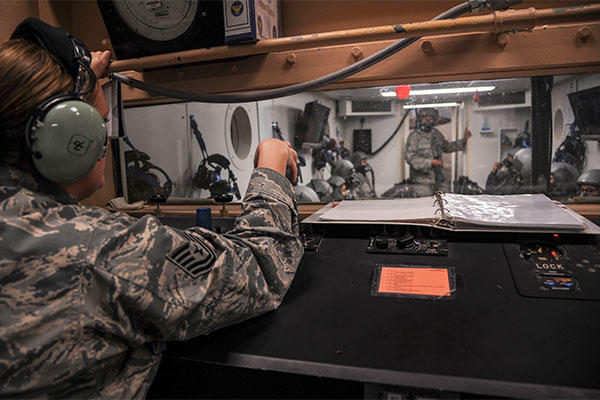LITTLE ROCK AIR FORCE BASE, Ark. (AFNS) -- For more than 50 years, aircrew at Little Rock Air Force Base, Arkansas, have shared a common physical experience; they all have felt the effects of rapid depressurization inside a hypobaric chamber.
Soon, that number will stop increasing as the base’s altitude chamber is scheduled for decommission.
The chamber testing is mandatory for all new aircrew members in order to learn their body's warning signs for hypoxia, or a lack of oxygen, during flight. Little Rock AFB Airmen, requiring initial training to be certified for high altitude flights, will now travel to other bases to train in an altitude chamber.
A team of approximately 20 Airmen from the 19th Aerospace Medicine Squadron have been responsible for running and maintaining the half-century-old chamber.
"About 45 people experience simulated flights in the chamber each month," said Tech. Sgt. Daniel Zerbe, the 19th AMDS aerospace and operational physiology NCO in charge.
The last chamber flight is slated for December, all current aircrew Airmen must still renew their oxygen deprivation training every five years. The 19th AMDS already has a solution in place for that requirement.
"We will now use two Reduced Oxygen Breathing Devices (RODB) attached to flight simulators," Zerbe said. "The devices allow the aircrew members to experience hypoxia by breathing higher concentrations of nitrogen."
The RODB costs between $40,000 and $60,000 annually for operation and maintenance as opposed to the approximately $2 million it costs for of the altitude chamber. The simulator is able to mirror almost every aircraft in the Air Force, and it allows pilots to focus on a task they normally would while flying.
"The pilots are never aware when they are off oxygen," said Zerbe. "Along with measuring how the oxygen deprivation affects their body, the simulators allow us to see how it affects their performance."
RODB is also safer since it's used in a more controlled environment and uses gas as the only variable.
Aircrew members will still have to experience the altitude chamber during their technical school training, but after the initial chamber training, they will use the new ROBDs for the rest of their careers.
"Although this means the end of a historical landmark at Little Rock AFB, we look forward to the integration of new Air Force technology," Zerbe said.























